food
Latest
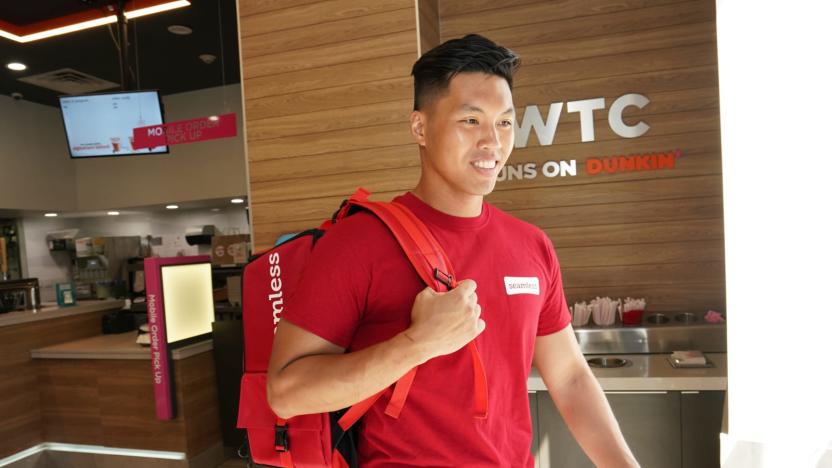
Grubhub is delivering Dunkin' donuts in New York City
If you're craving donuts but can't step outside to get them, some extra relief might be at hand. Grubhub is rolling out the option to order from Dunkin' through its apps, starting with Seamless customers in New York City. It'll reach other markets in the months ahead, including Boston, Chicago and Philadelphia. Deliveries will be free between June 24th and June 30th to sweeten the deal (beyond the sugar in your orders, that is) for early adopters.
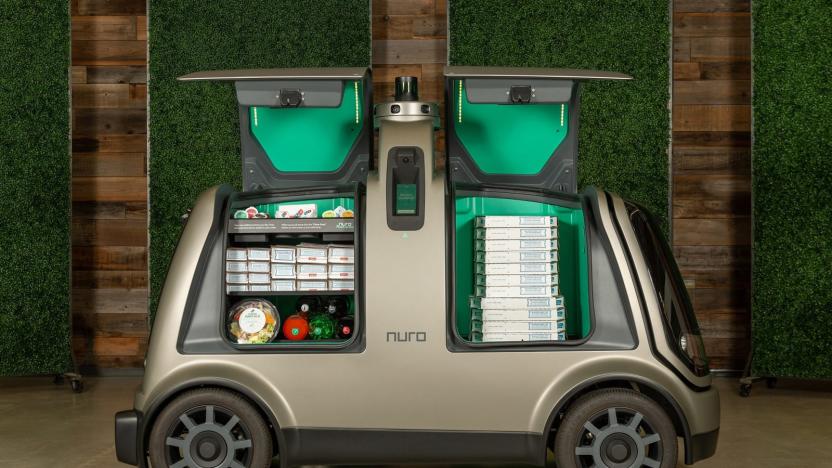
Domino's will use self-driving vehicles to deliver pizza in Houston
Domino's is determined to make autonomous pizza delivery a practical reality. The chain has unveiled plans to deliver pies to "select" Houston customers later in 2019 using Nuro's self-driving R2 vehicle. If you order online from a participating store and have a little bit of luck, you'll get the choice of a robotic courier -- pick that and you'll get a PIN code to unlock a compartment on the R2 and grab your meal. While this doesn't bode well for human delivery drivers, Domino's is betting that this could help stores deal with the crush of orders and bring your pizza on time.
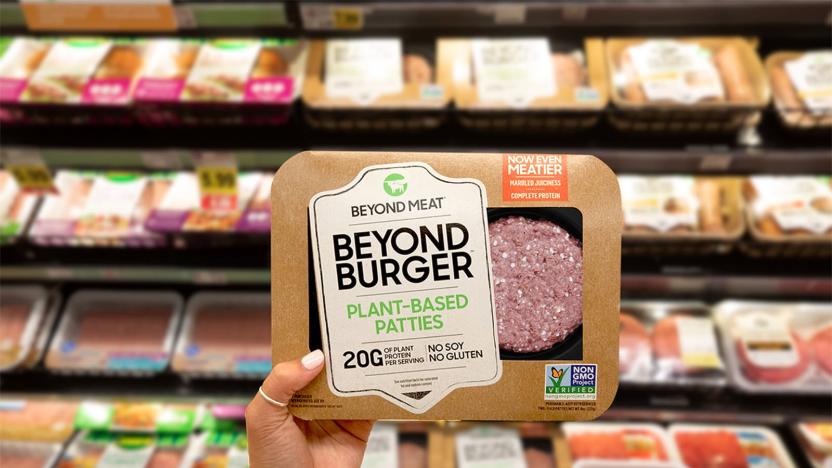
Beyond Meat answers Impossible Foods with 'meatier' plant patties
Beyond Meat isn't going to sit by the wayside while Impossible creates juicier versions of its plant-based burgers. The company is rolling out a "meatier" version of the Beyond Burger to grocery stores across the US. The mix of mung bean, pea and rice proteins is supposed to have a more meat-like, "neutral" flavor and texture, complete with marbling (through cocoa butter and coconut oil) that even behaves like fat. You'll also get a more "complete" selection of proteins through the mix of mung bean, pea and rice. And if appearance matters, apple extract changes the color from red to brown during cooking.
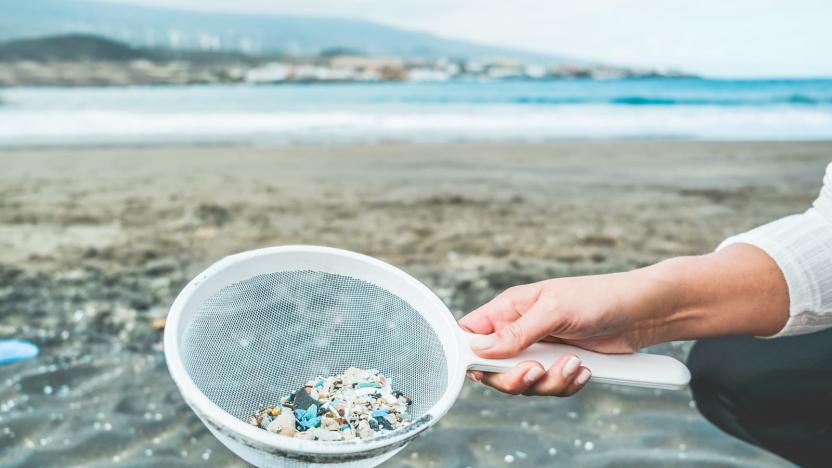
Americans consume an alarming amount of microplastics
Americans consume tens of thousands of microplastic particles every year -- and that's just from the food we eat. Microplastics are also found in the air we breathe and the water we drink. Thanks to a study published in the journal Environmental Science & Technology, we have a better idea of just how much plastic Americans consume.

Nestle claims its plant-based Awesome Burger is healthier than rivals
Beyond Meat and Impossible Foods are about to have some major competition. Nestle's Sweet Earth is prepping the Awesome Burger, another take on plant-based hamburgers. The veggie mix (which includes yellow peas and wheat) should have largely realistic juiciness and taste, but promises to be healthier in some respects than its rivals. It'll have six grams of fiber versus the three you typically find in Beyond and Impossible patties, for example. You can also expect more more protein than a meat burger (28g versus a typical 20g), no saturated fat and lots of iron and Vitamin C.
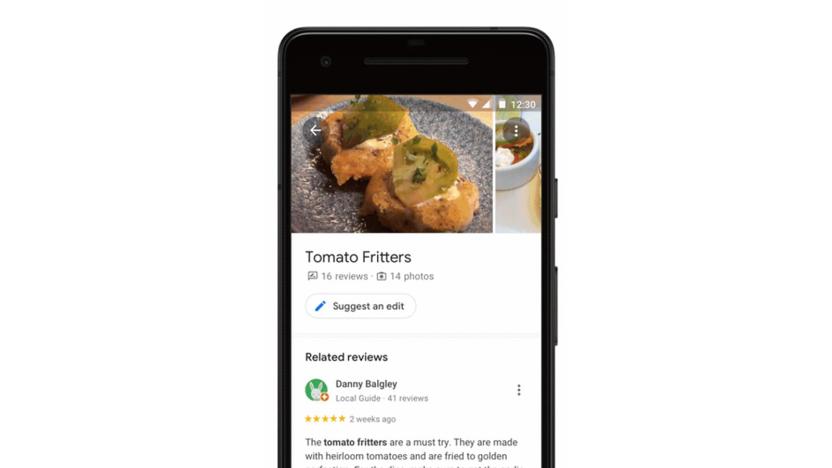
Google Maps AI helps you discover a restaurant's popular dishes
Google is trying to take some of the guesswork out of trying a new restaurant. The company is trotting out an update to Google Maps that uses machine learning to highlight the popular dishes at an eatery. Tap on a place and it'll show the most popular meals in the overview section, with the menu tab showing the most discussed options. If you're curious to know more (and prevent any rude surprises at the table), selecting a dish will show reviews and photos.

Lyft offers flat fares for people living far from grocery stores
We've seen a range of partnerships between ride-share apps and grocery stores in recent times. Walmart and Uber teamed up last year, for example, while Asia's Grab has expanded to include grocery delivery. And, of course, there are multiple companies experimenting with grocery delivery via autonomous vehicles. But none of these initiatives address a major underlying issue in getting food to the people who want it: cost. Today, though, Lyft is launching a national Grocery Access Program that aims to make healthy food more cheaply and easily accessible to millions of Americans.
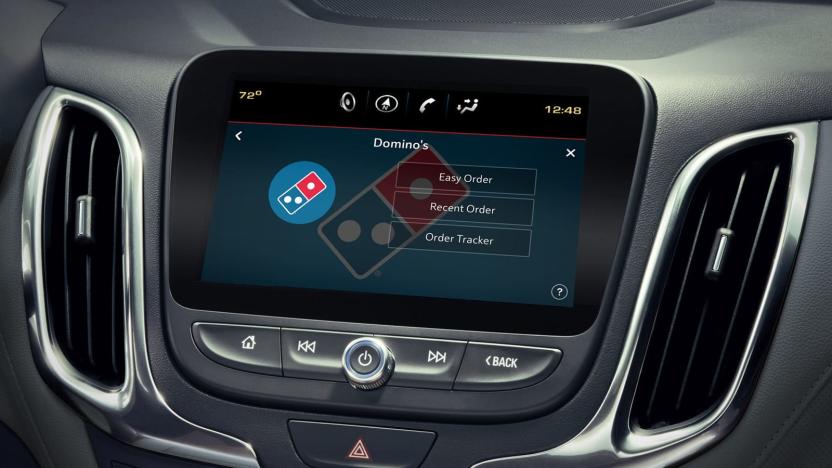
You can soon order Domino's pizza from your car's touchscreen
Domino's is continuing its quest to let you order pizza through every device imaginable. It's partnering with Xevo on an app that can order pies through your car's infotainment system, no tethered smartphone required. You can avoid distractions by placing an Easy Order or repeating your last order, and track your food's progress. There's also an option to make an order by phone in case you have a complex request or just prefer human contact.
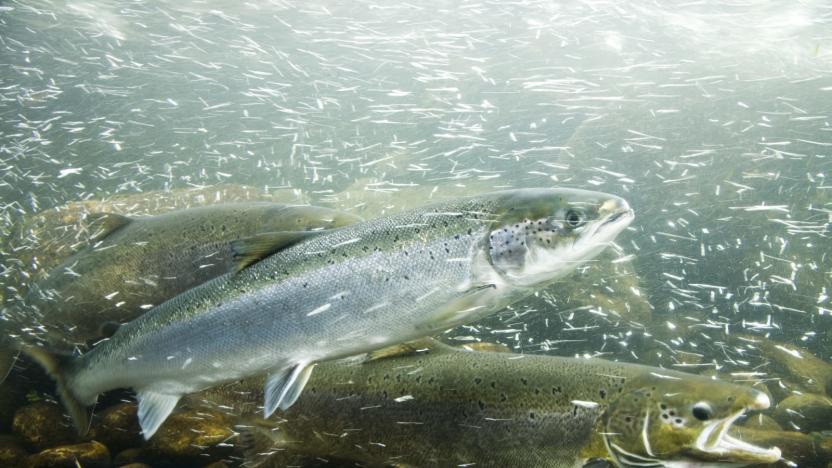
FDA removes restrictions on genetically modified salmon
Genetically modified fish are about to become more of a practical reality in the US. The Food and Drug Administration has lifted an import alert on AquaBounty's genetically modified AquAdvantage salmon eggs, allowing the fish to reach the US over three years after they received initial approval. Congress told the FDA in 2016 to block modified salmon until it issued labeling guidelines, and the Administration believes Congress' newly-enacted National Bioengineered Food Disclosure Standard meets that criteria.
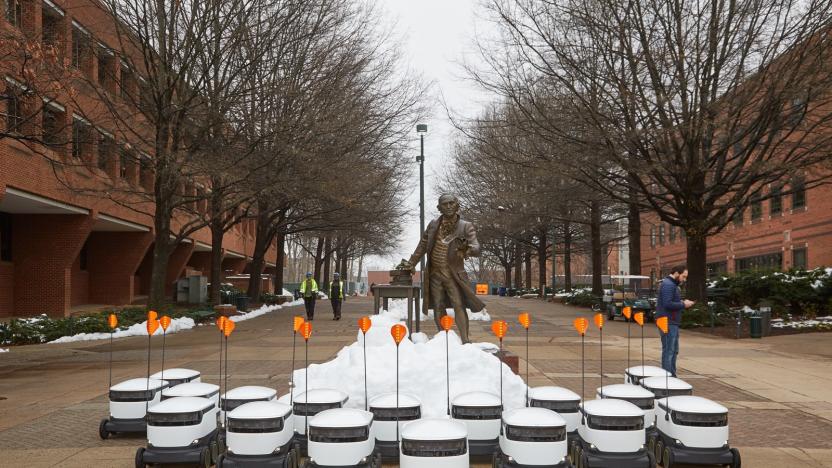
Starship robots will deliver pizza and coffee to George Mason students
It just became that much easier for students to grab food without interrupting a study break. Starship and Sodexo have launched a robot food delivery service at Virginia's George Mason University, giving students and staff access to food within an average of 15 minutes or less. Pay $2 through Starship's mobile app and one of the more than 25 automatons will deliver pizza, coffee and other grub to a convenient pickup point on campus. It even ties into the school's student meal plans (the first such tie-in anywhere, according to Starship) and debit program.

Stop & Shop is bringing autonomous food stands to Boston
Forget self-driving grocery delivery cars -- Stop & Shop wants robotic vehicles to bring a chunk of the store to your door. It's launching autonomous grocery vehicles in the greater Boston area that will let you shop for produce, meal kits and "convenience items" (think bread and eggs) just outside your home. You just have to hail one of the Robomart-made cars through a mobile app, unlock the vehicle when it arrives, and pick your food -- a combination of computer vision and RFID tagging automatically flags your purchases. It's not quite Amazon Go on wheels, but it's close.

Food tracking comes to Google Assistant with Lifesum
You no longer have to pull out your phone (or look at your watch) to track your dietary habits. Lifesum has introduced what it says is the first food tracking app for Google Assistant, making it easier to keep tabs on your eating patterns. If you ate a large meal or grabbed a glass of water, you just have to use your voice to add that to your log. You can also update your body weight, tackle challenges (such as hiding sugary food in your kitchen) and ask for updates on your progress.
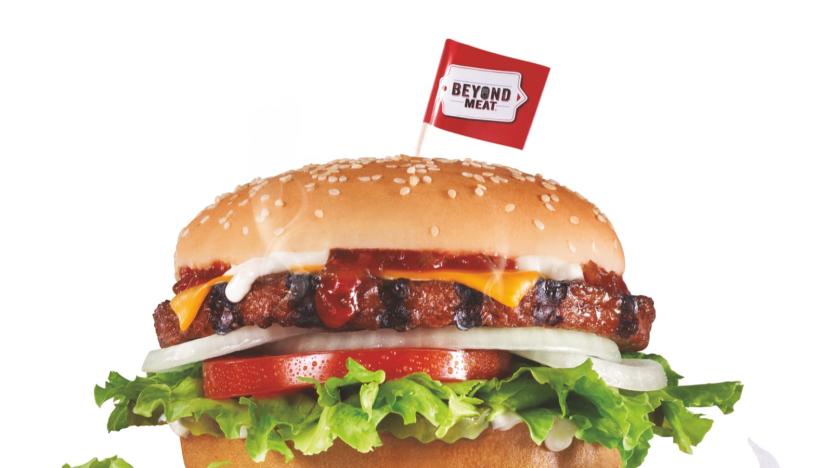
Meatless 'Beyond Burgers' come to Carl's Jr. restaurants
The competition in lab-made veggie burgers is heating up. Beyond Meat has brought its burgers to more than 1,000 Carl's Jr. locations in the US, marking its Beyond's largest restaurant deal to date. Order a $6.29 Beyond Famous Star and you can eat a vegetarian (sorry vegans, there's American cheese) burg that tastes much like its conventional beef counterparts. You can also pay $2 to add a Beyond patty to other burgers on the menu.
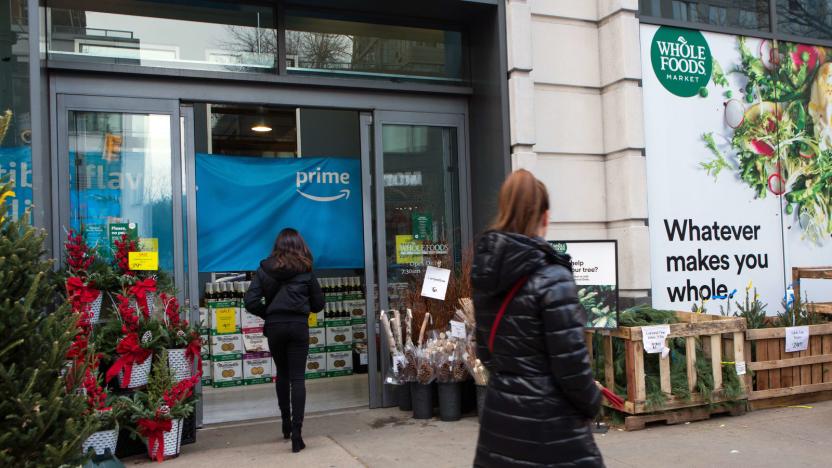
Amazon will build more Whole Foods stores to expand Prime Now
Amazon hasn't been shy about using Whole Foods stores to hawk its own wares, but now it's apparently building stores with that primarily in mind. Wall Street Journal sources have learned that the internet giant aims to build and enlarge Whole Foods locations around the US to put more people within reach of Prime Now's two-hour deliveries. The ultimate aim is to make Prime Now available at "nearly all" of Whole Foods' 475 US stores (plus new shops) where it's only available in slightly over 60 cities today.

Starbucks will offer Uber Eats delivery from more than 2,000 US stores
It might be almost too easy to get a Starbucks fix in the near future. In the wake of trials, the coffee giant will offer delivery through Uber Eats from over 2,000 US stores (roughly a quarter of its footprint in the country) in early 2019. The company hasn't detailed pricing or selection, but there's a good possibility that a grande mocha latte will be just a few taps away.
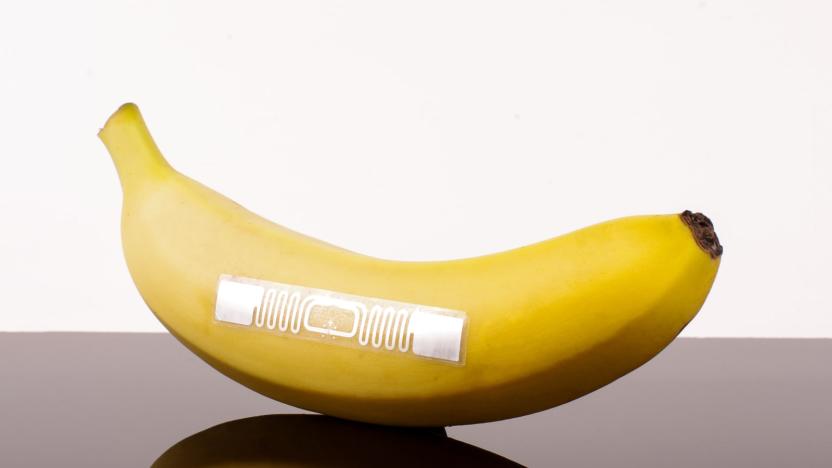
Everyday RFID tags could help spot food contamination
You might not need special sensors or old-fashioned inspections to tell whether food has gone bad. If MIT has its way, the tags you already find on your food might do the job. Its researchers have developed a wireless system, RFIQ, that detects potential food contamination based on minute changes in the signals emanating from the RFID tags you often see on containers. As different materials absorb different amounts of the tags' electromagnetic frequencies, you can use a reader to spot changes in response signals and identify food contamination. If a foodstuff dries out, for instance, you'd notice a different signal than when it was still moist.
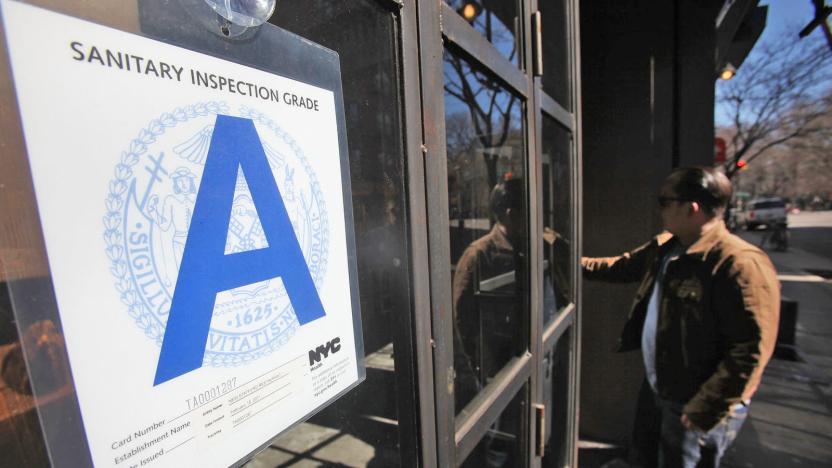
Google model identifies restaurants that could give you food poisoning
Google could soon tell you which restaurants are more likely to give you food poisoning, thanks to an algorithm that can identify lapses in food safety in near real time. Working with researchers from Harvard University, Google tested a machine-learned model in Chicago and Las Vegas to identify user search queries such as "stomach cramps" or "diarrhea", and then cross-referenced them with saved location history data -- in particular recently-visited food establishments -- from the smartphones used to make those searches.
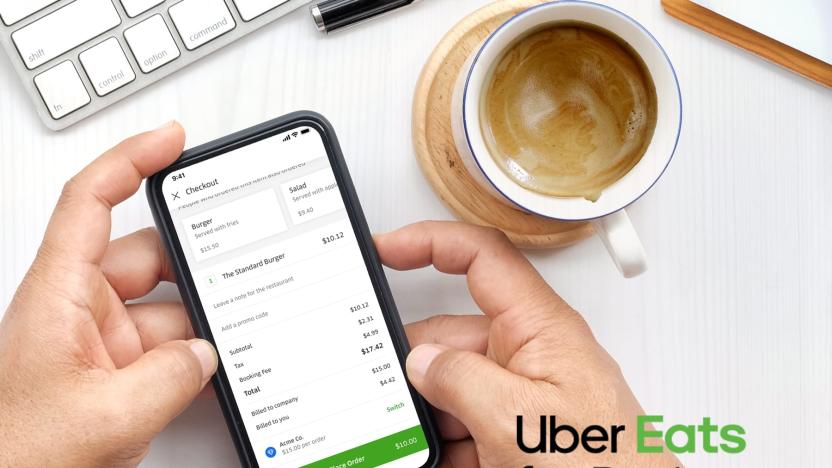
Uber Eats makes it easier to expense business lunch
If you're pulling an all-nighter at the office, it's easy enough to reach for your phone and grab something from Uber Eats. It's a popular thing to do, too, with corporate expense platforms seeing Eats requests skyrocket over the last year. It's why Uber for Business is now integrating Eats for Business, a new way for companies to keep an eye on, and control, what you're ordering.
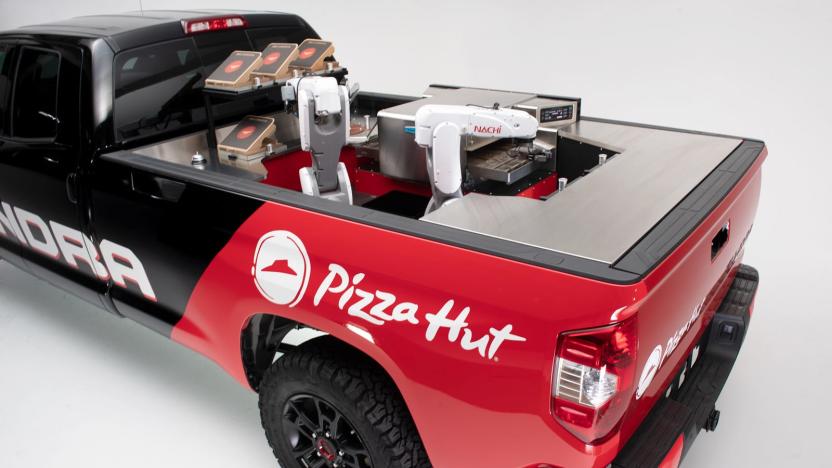
Pizza Hut's hydrogen delivery truck hauls a robotic kitchen
Pizza Hut will not be outdone in the pursuit of over-the-top delivery vehicles. The restaurant chain has teamed up with Toyota to unveil the Tundra Pie Pro, a concept hydrogen fuel cell truck that not only cooks pizzas, but uses a pair of robot arms to move them along the line. The mechanical limbs fetch pre-assembled pizzas, bake them, slice them and slide them into boxes all on their own -- they'll even ring a bell to let you know your meal is ready.

Jet.com is the first online retailer selling Blue Apron meal kits
If you're Blue Apron and you see Amazon encroaching on your turf with its own meal kits and key online partnerships, what do you do? Make your kits more widely available, that's what. In a reflection of its retail promises from earlier in the year, Blue Apron kits are now on sale through Jet.com's City Grocery service -- the first time they've been available through an online retailer. Should you live in the New York City area (including Hoboken and Jersey City), you can order from a selection of quick-to-prepare two-serving kits that will reach your door either the same day or the next.



